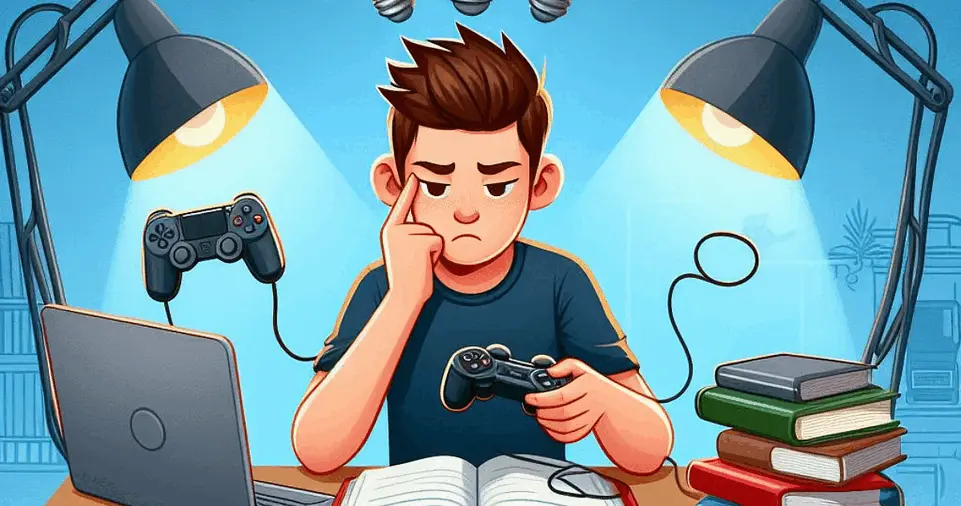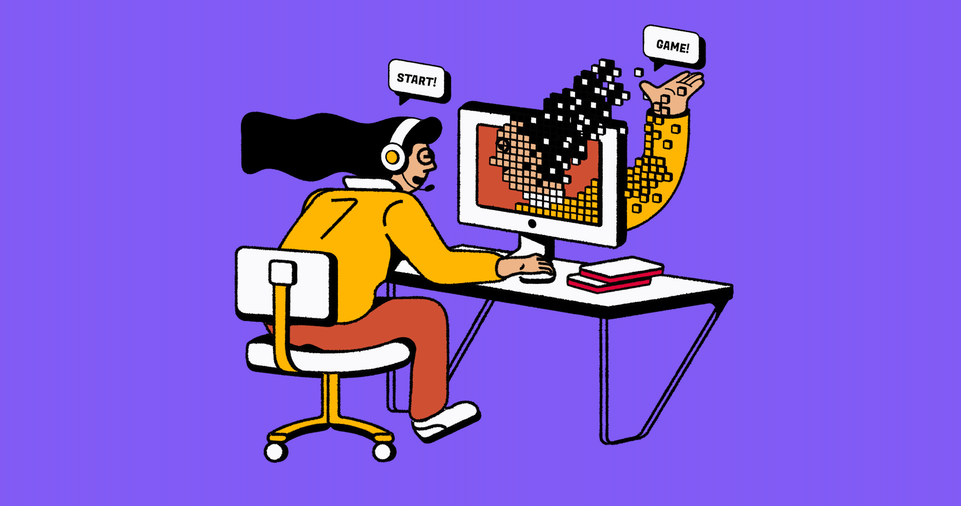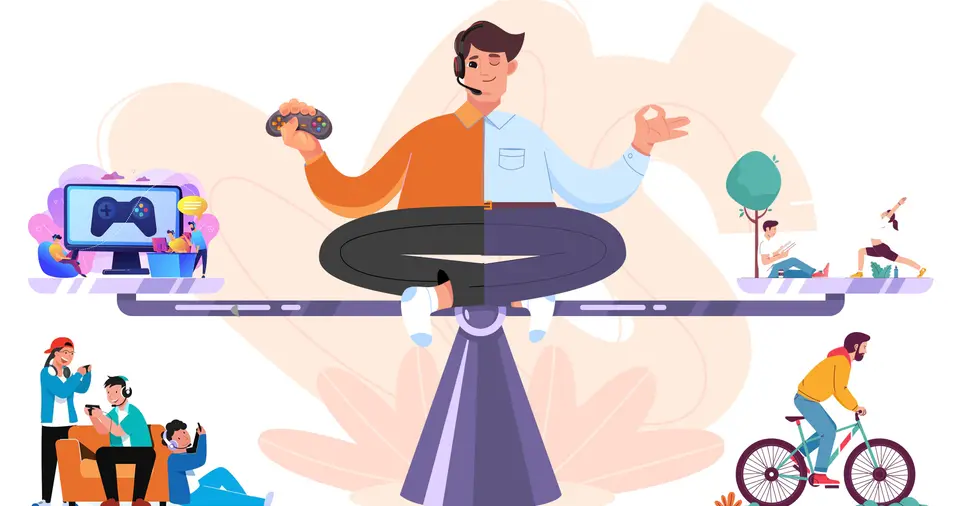Gaming has become a massive part of modern entertainment, offering an immersive escape, social connectivity, and even career opportunities through streaming, esports, and content creation.
However, excessive gaming can interfere with real-life responsibilities, personal growth, and overall well-being.
Balancing gaming with daily life is essential to ensure that it remains an enjoyable hobby rather than a detrimental addiction.
Many gamers struggle with managing their time effectively, leading to issues such as poor health, declining academic or work performance, and reduced social interactions.
Finding the right balance allows you to enjoy gaming while still excelling in your responsibilities.
This guide will provide detailed insights into managing your gaming habits while ensuring a fulfilling and productive life.
Whether you’re a casual gamer or a professional, applying these strategies can help you optimize your lifestyle and maintain a healthy equilibrium between the virtual and real world.
The Importance of Setting Priorities
Why Prioritization Matters
One of the most crucial aspects of balancing gaming and real life is setting clear priorities.
Without structured priorities, gaming can quickly overshadow important aspects such as education, career, relationships, and personal well-being.
Understanding what tasks require your immediate attention will help prevent gaming from becoming a distraction.
How to Set Priorities Effectively
Start by listing your daily or weekly responsibilities and ranking them based on importance.
Essential tasks such as work, studies, exercise, and social interactions should always come first.
Gaming should be treated as a recreational activity rather than a necessity.
To maintain discipline, consider using planners or mobile apps to schedule your day, ensuring that gaming fits into your routine without disrupting other commitments.
Gaming as a Reward System
A great way to maintain control over your gaming habits is by using it as a reward.
Completing a work assignment, finishing schoolwork, or achieving a fitness goal can be followed by a set period of gaming.
This approach not only keeps you motivated but also ensures that responsibilities are met before indulging in gaming sessions.
Creating a Structured Gaming Schedule

The Role of Time Management
Time management is key to balancing gaming and real-life activities. When gaming is unregulated, it can lead to hours of lost productivity.
Establishing a structured schedule ensures that you dedicate sufficient time to essential responsibilities while still enjoying your favorite games.
Steps to Create a Balanced Schedule
- Allocate Fixed Gaming Hours – Determine specific hours for gaming, ensuring that it does not interfere with work or study time.
- Set Daily Limits – Limit your gaming sessions to a fixed duration, such as 1-2 hours on weekdays and extended time on weekends.
- Use Alarms and Timers – Setting reminders helps you avoid exceeding your allotted gaming time.
- Prioritize Important Tasks – Complete essential responsibilities before engaging in gaming.
- Consider a Gaming-Free Day – Taking a break from gaming once a week allows you to focus on other activities.
By following a structured schedule, you prevent gaming from taking over your life while still enjoying your favorite titles in a controlled manner.
Avoiding Gaming Addiction
Recognizing Signs of Addiction
Gaming addiction can be detrimental to mental and physical health.
Some signs that indicate gaming is becoming an addiction include:
- Neglecting work, studies, or personal relationships.
- Experiencing irritability or anxiety when not gaming.
- Playing for extended hours without realizing time passing.
- Skipping meals or neglecting personal hygiene due to gaming.
Strategies to Prevent Addiction
- Self-Monitor Your Habits – Track how much time you spend gaming and analyze whether it is excessive.
- Engage in Other Hobbies – Diversify your interests by taking up reading, sports, or creative activities.
- Set Break Intervals – Every 45-60 minutes, take a break to stretch, hydrate, or engage in a different activity.
- Use Gaming as a Secondary Activity – Ensure that gaming doesn’t dominate your daily routine by treating it as a leisure activity rather than a priority.
Maintaining awareness of your gaming habits helps prevent addiction while still allowing you to enjoy gaming in a balanced way.
ALSO READ: How to Set Up a Smart Home System Easily
Staying Physically and Mentally Healthy
The Impact of Gaming on Health
Long hours of gaming can negatively impact both physical and mental health.
Issues such as eye strain, poor posture, sleep disturbances, and stress accumulation are common among gamers who do not take necessary precautions.
Health Tips for Gamers
- Exercise Regularly – Engage in physical activities such as jogging, yoga, or gym workouts to maintain overall fitness.
- Maintain Proper Posture – Use an ergonomic chair and ensure that your gaming setup promotes good posture.
- Follow the 20-20-20 Rule – Every 20 minutes, look at something 20 feet away for at least 20 seconds to reduce eye strain.
- Get Sufficient Sleep – Avoid gaming late at night to ensure a consistent sleep schedule.
By prioritizing physical and mental health, you can continue gaming without compromising overall well-being.
Socializing Beyond Gaming

Why Social Interaction Matters
Spending excessive time gaming can lead to isolation from friends and family.
Maintaining a balance between online and offline interactions ensures that relationships remain strong.
Ways to Improve Social Interactions
- Plan Outings with Friends – Engage in outdoor activities such as dining out, sports, or travel.
- Participate in Group Events – Attend social gatherings, family functions, or networking events.
- Limit Solo Gaming – Play multiplayer games with real-life friends to stay socially connected.
- Engage in Community Activities – Join clubs, volunteering initiatives, or local meetups to interact with new people.
Balancing gaming with social interaction fosters better communication skills and a well-rounded lifestyle.
Monitoring Screen Time Effectively
The Dangers of Excessive Screen Time
Prolonged screen exposure leads to eye fatigue, headaches, and reduced focus on real-life responsibilities.
Monitoring screen time helps maintain a healthy balance between gaming and other activities.
Tips to Reduce Screen Time
- Use Screen Time Tracking Apps – Monitor daily gaming hours using apps like Digital Wellbeing (Android) or Screen Time (iOS).
- Take Regular Breaks – Short breaks every hour help refresh the mind and prevent fatigue.
- Limit Non-Essential Screen Usage – Reduce social media scrolling and unnecessary phone usage outside of gaming.
By monitoring screen time, you can prevent negative effects while maintaining a balanced digital lifestyle.
ALSO READ: How to Shop Smart and Avoid Fashion Scams
Conclusion
Balancing gaming and real life effectively requires discipline, self-awareness, and structured planning.
By setting clear priorities, managing time wisely, avoiding addiction, staying physically active, and maintaining strong social connections, you can enjoy gaming without compromising other aspects of life.
Gaming is an incredible form of entertainment, but when left unchecked, it can negatively impact your responsibilities and well-being.
By applying the strategies outlined in this guide, you can create a balanced and fulfilling lifestyle where gaming enhances rather than hinders your personal growth and success.
Remember, a well-balanced life leads to more enjoyable gaming experiences and greater achievements in both the virtual and real world.

